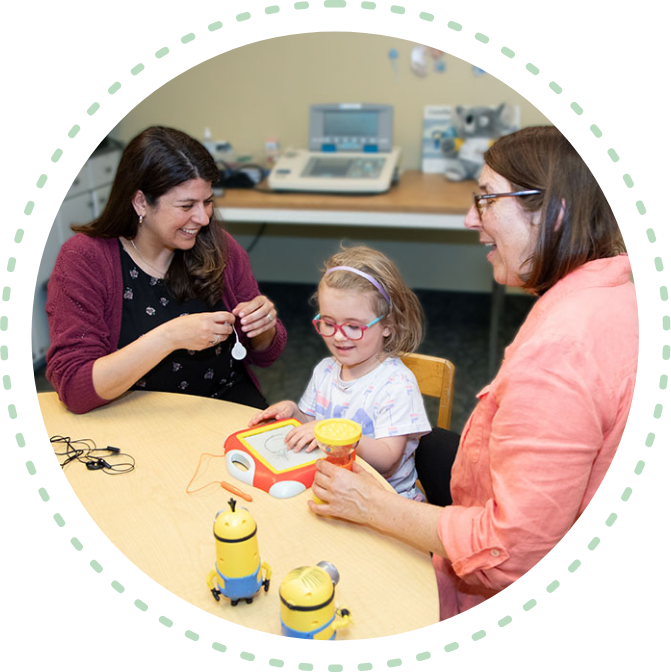Empowering children with hearing loss to listen, speak, and thrive

Empowering children with hearing loss to listen, speak, and thrive
The auditory-verbal approach
At Résonance Montréal, we use the auditory verbal approach to help children with hearing loss develop strong listening and spoken language skills. This approach emphasizes early diagnosis, consistent use of hearing technology, and active parental involvement. Children learn to communicate naturally — without relying on sign language — enabling them to integrate fully into mainstream education and the hearing world.
When a child is diagnosed with hearing loss, the entire family must adjust to the reality of the condition. Over 90% of children with hearing loss are born to hearing parents, many of whom wish for their child to develop spoken language. While there is no one-size-fits-all approach, research confirms that hearing is crucial for spoken language development. Advances in hearing technology now allow children with any degree of hearing loss to access sound, which is vital for stimulating the brain’s auditory regions—especially during the critical first three years of life.
Auditory-verbal education supports this development by focusing on listening skills and empowering parents to take an active role.

Auditory-verbal education is the only practice focused on auditory access and auditory training in order to develop spoken language.

The best approach for supporting mainstream integration of students
Auditory-verbal education is the only practice focused on auditory access and auditory training in order to develop spoken language. It is therefore fair to say that auditory-verbal education is the only method that takes full advantage of the evolution of hearing technology. It enables more and more children with hearing loss to develop listening and language skills. This means that students can be integrated into a regular school environment and can function without the need of an interpreter or the use of sign language (ASL, LSQ, Cued Speech or other).
To learn more, visit Hearing First.



The Quebec Ministry of Education and Résonance Montréal
Résonance Montréal is a private school in the public interest. It is a member of the private special needs schools network (REPAS) of the FEEP (Fédération des établissements d’enseignement privés) and of the Quebec Association of Independent Schools (QAIS).
Being “private in the public interest”, Résonance Montréal is partly subsidized by the Quebec Ministry of Education. That is why the vast majority of students attending the school are referred by the school service centres and by the English-language school boards of the Greater Montreal area. Referrals can also be done by health professionals or families. The goal is to achieve successful mainstreaming.
Furthermore, the Quebec Ministry of Education is also committed to the successful integration of children with hearing loss into their neighbourhood schools. To meet this objective, the ministry has granted a supra-regional mandate to Résonance Montréal to support school personnel in all Quebec English language school boards that service students with hearing loss.

